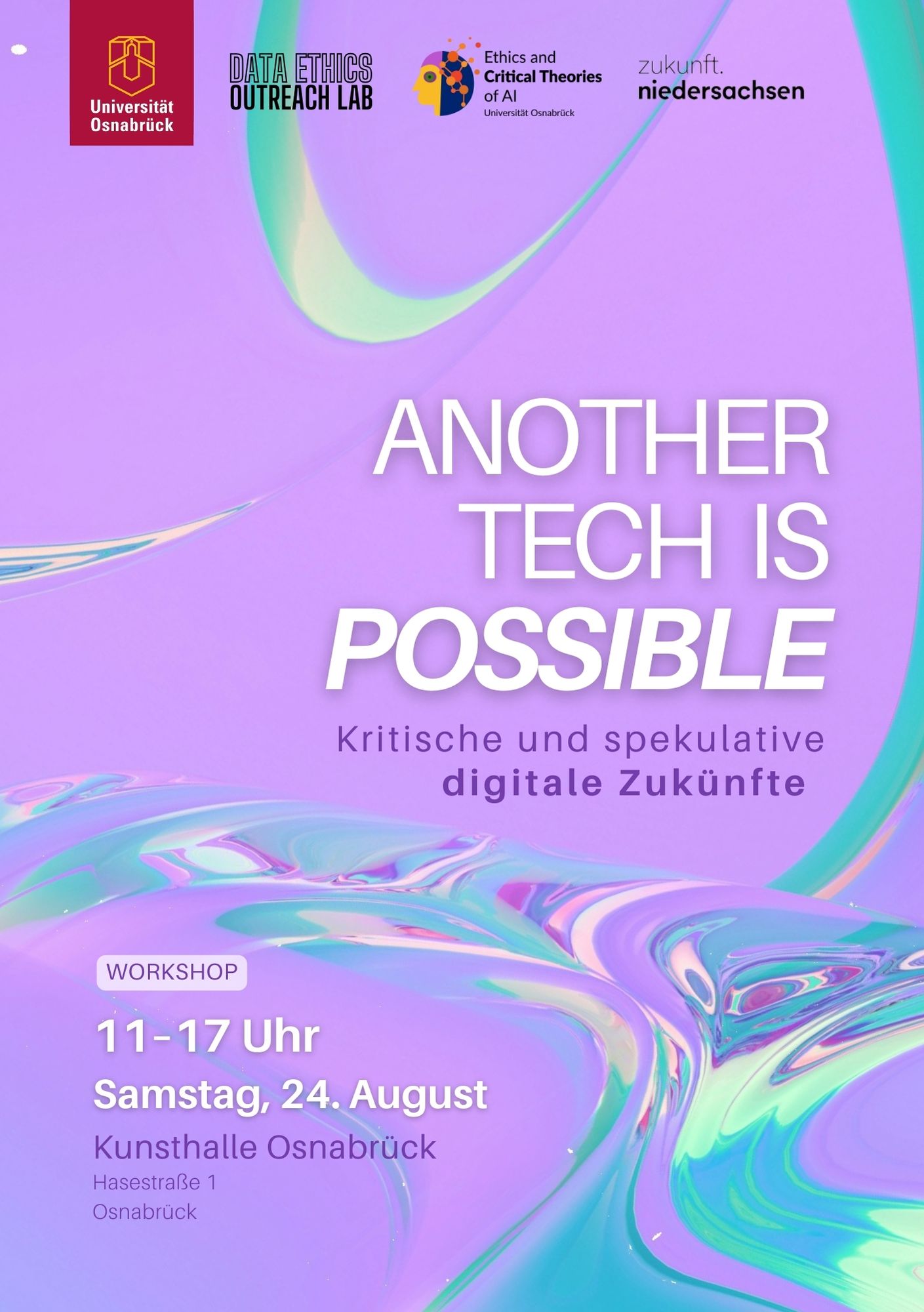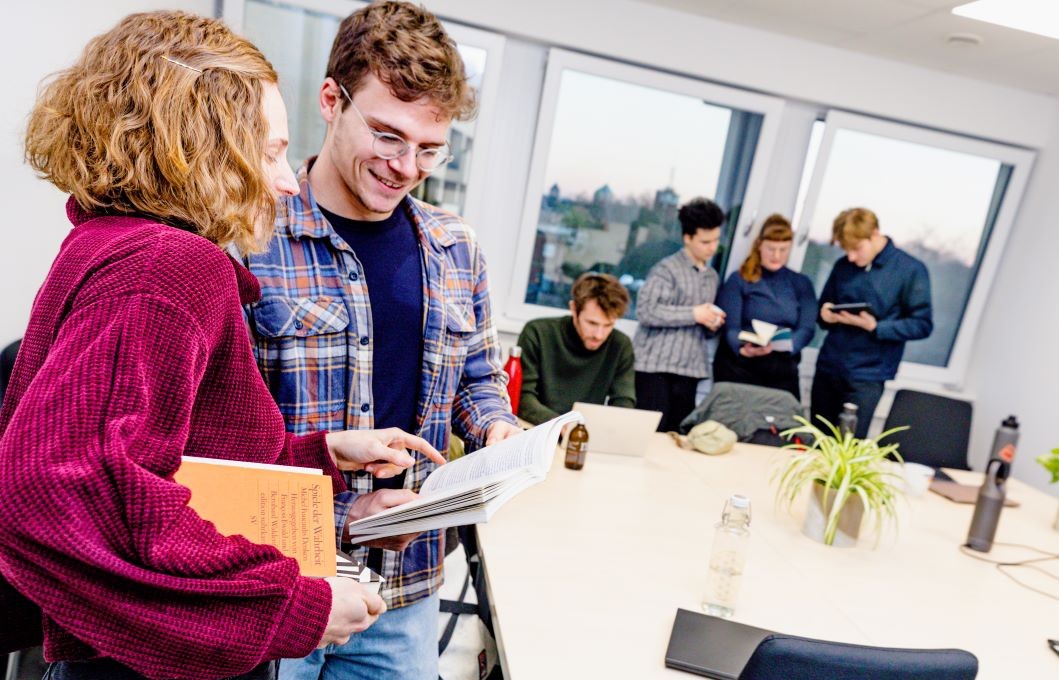Main content
Top content
Predicted futures?
Our new project "Predicted Futures?" was launched in April 2024 with funding from the "zukunft.niedersachsen" program of the Ministry of Science and Culture, Lower Saxony. We are delighted to have Theater Osnabrück and Kunsthalle Osnabrück at our side as cooperation partners.
The project looks at the concept of predicted futures from two perspectives: On the one hand, we focus on the social and societal impact of predictions in predictive analytics. Secondly, we offer a critical examination of the narrative of technological determinism by presenting technology and society as interwoven processes. Through intergenerational dialogues, we want to encourage young people in particular to actively participate in shaping AI technologies.
The following components will be carried out as part of the project:
Workshop on Saturday August 24, 2024

In this workshop at the Kunsthalle Osnabrück, we invite the general public to join us in taking a closer look at current ideas about the future. From flying cars to virtual cyber worlds: A future without smart digital technologies seems almost unimaginable today. But whose future is it really?
Although technological futures often present themselves as revolutionary, they also reinforce old ideas, existing power relations and ways of life.
We want to question deeply rooted ideas about the future in both a critical and visionary way and consider together what alternative, sustainable and socially just technological futures could look like.
These questions will be critically, visionary, and playfully discussed on August 24, 2024, from 11:00 AM to 5:00 PM at the Kunsthalle. The workshop will be held in German. There will be breaks with snacks and drinks. Participation is free of charge. Please register in advance by emailing outreachlab@ethikderki.de.
Workshops with school classes
In cooperation with Theater Osnabrück, which is staging the dystopian science fiction play "(R)Evolution" by Yael Ronen and Dimitrij Schaad in the current season, we offer workshops for school classes to delve deeper into the topics covered. Together with the pupils, we work on the ethical challenges that predictive AI poses to the basic democratic order and formulate alternative, more desirable technical future scenarios. This work is accompanied by our "Data Ethics Outreach Lab" study project. Cognitive Science Master's students gain practical knowledge in the conception, implementation and scientific evaluation of workshops. The workshop concepts developed are then prepared as **Open Educational Resources**, freely accessible teaching materials that teachers can use for school lessons.
Completed:
Introductory event: KI Macht Zukunft? Interactive panel discussion on Tuesday June 11, 2024
Data Ethics Outreach Lab
The Data Ethics Outreach Lab is a study project and interdisciplinary course for CogSci M.Sc and Lehramt students.
For further information, please visit the the project page at rainermuehlhoff.de.
Find out more about our DEOL course!
Why does the data collected by Instagram or YouTube lead to social inequality? How do Snapchat, TikTok and Co. (re)structure social relationships and restrict the identity performances available to young people online? What does PayPal do with all the data they collect from payment transactions? Why do chat bots perpetuate stereotypical gender norms? And how does riding a bus without a ticket relate to being denied a loan?
These questions represent only a handful of possible vantage points from which to explore and critically reflect on key issues in the field of digital consumer culture. Many of these issues relate to big data and AI services we use every day. In most cases, users are not aware that these services have harmful effects on our societies, democracies and well-being.
Within this study project we will discuss the risks and societal implications of networked digital services to develop strategies and formats for public awareness raising. Participants will form small teams to choose their own topics – along the technologies and issues they perceive most pressing. There is also a wide range of possible outreach formats that teams can choose from: Developing and testing Open Educational Resources for school lessons with high school students; organising workshop (Lehrer:innen-Fortbildung) for school teachers in autumn; recording explainer videos to circulate on the web; creating public websites, social media channels and other public interventions.
The project is funded by the "zukunft.niedersachsen" program of the Ministry of Science and Culture, Lower Saxony.
SIMPORT ‒ a completed project on ethics of location-data funded by German Federal Ministry of Education and Research
Rainer Mühlhoff was head of the philosophy sub-project “Ethics of Interaction Design” within the interdisciplinary project SIMPORT ‒ Souveränes und Intuitives Management personenbezogener Ortsinformationen (sovereign and intuitive management of personal location information). The project collected research in data ethics and in issues of data protection and personal autonomy in the context of mobile GPS data collection.
For further information, please visit the project website at simport.net.

© Simone Reukauf
Our goal was an empowering human-machine interaction when accessing GPS data on mobile devices. Our learning tool aimed at raising awareness of users for inferential analyses that can be created based on such data.
Together with our partners from the field of computer science and the industries, our sub-project developped an ethics-by-design approach for participatory models of implementing responsible technological design.
The project was funded by the German federal ministry of education and reseach as part of its funding line human-machine interaction for digital sovereignty.
SIMPORT was a collaboration between the Institute of Geoinformatics (ifgi) at the University of Münster, the Institute for Societal Aspects of the Digital (GUD) at the FH Münster, the University of Osnabrück, Reedu GmbH & Co. KG, and HERE. SIMPORT was part of the Digital Autonomy Hub.

